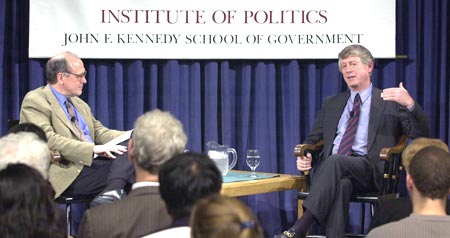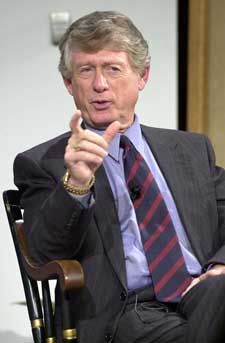Inside newsman Ted Koppel
One of television’s most respected and familiar figures revealed some of the person behind the persona during an appearance at the Kennedy School of Government (KSG) on Monday night.
ABC News “Nightline” host Ted Koppel touched on an array of sensitive topics ranging from journalistic integrity to presidential politics to spirituality while discussing his new book “Off Camera: Private Thoughts Made Public” (Knopf, 2000), and answering questions from students and the public before a large audience at the Arco Forum.

Alex S. Jones, director of the Joan Shorenstein Center on the Press, Politics, and Public Policy, who served as moderator for the evening, kicked off the discussion by asking Koppel why he wrote the book, which is a compilation of Koppel’s journal entries from 1999.
“When you’ve appeared on television as often and for as long as I have, people come to believe that they know what your opinions are,” Koppel responded. “So I came to the conclusion that I would rather have people dislike me for what I really believe than like me for what they think I believe.”
Exposing his private thoughts in the public arena is a risky venture, Koppel said, but not necessarily a violation of any journalistic credo.

“I think there is confusion in the public’s mind about what a journalist’s responsibilities are,” he explained. “We are not a bunch of intellectual eunuchs who walk around for all of our lives with no opinions on anything. I find journalists to be among the most opinionated men and women I know, and among journalists, I am probably as opinionated as any of them. … My responsibility is not to let my opinions show in my work.”
Koppel admitted, however, that some reporters do cross over ethical boundaries, compromising the integrity of the news product. “I frequently argue that television journalism today and print journalism today is better than it’s ever been. Simultaneously, unfortunately, it’s also worse than it has ever been,” he said. “We have more good journalism and more bad journalism co-existing, and frequently the bad drives out the good.”
Much of the bad journalism can be attributed to tight deadlines, according to Koppel. “Now you have cable networks whose deadlines are constant, and the pressure to produce information all day long creates a dynamic in which getting it first becomes more important than getting it right,” he said.
Competition, Koppel insists, is the “one guarantee of quality control” in journalism.
“What worries me most is that I will get a story wrong,” he said. “What worries me even more is that one of my colleagues from CBS or NBC will get it right and point out that I’m wrong! What keeps journalists honest is the fear of competition. Anything that diminishes that competition, I worry about.”
Asked by Lara Setrakian ’04 if the advent of news coverage on the Internet will lead to broadcast journalism’s demise, Koppel demurred, warning of an “information anarchy” that will explode in the coming years. “The great frustration in the immediate future is going to be that you will have thousands of items appearing on the Internet, and you won’t know which ones to believe,” he explained. “You’ll have to go back to some tried and true familiar faces in the media.”
One of those faces belongs to Koppel, the son of German-Jewish parents, educated in British boarding schools where he claims he was ostracized for his effusive personality. “I was judged to be a show-off,” he says. “So I found myself ‘in Coventry’ – a form of loneliness, which is both painful and conducive to introspection.”
It was during that time, Koppel believes, that he sharpened his skills for listening and learning. “I had not been paying attention to the signals that people generally give off whether they like you or dislike you,” he said. “I think the thing that makes me a competent interviewer today is that I listen carefully to what my guest is saying.”
He has been listening to and questioning many of the world’s most prominent newsmakers now for 20 years as host of “Nightline,” and Koppel says he has just begun the process of helping search for his eventual replacement. “Whoever it is won’t be a Koppel clone,” he told the audience.
Some may have been disappointed by that comment.




